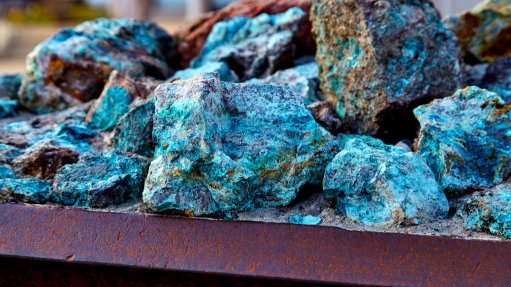
ORE AT THE FORE The renewable-energy market has created a greater demand for copper, with current copper production not matching global demand
Although there are substantial copper operations and project developments under way in South Africa, such as those in the provinces of the Northern Cape and North West, copper industry cluster Copper Development Association Africa (CDAA) says the country does not fully reap the benefits of these endeavours.
The association notes that many of these operations can add upwards of 80 000 t of copper a year to the local market, but it is unknown how much of this production will actually reach the market.
“Most of South Africa’s copper is being exported as ‘scrap’, owing to the attractive prices being offered globally for such products, and it is unlikely that mining production would be treated any differently,” says CDAA nonexecutive chairperson Evert Swanepoel.
The melting of copper into billets, blocks and ingots, which are then exported legally and illegally, is more often than not done without giving domestic manufacturers the opportunity to procure the copper for local production.
“Some of our major manufacturers are in an ideal position to increase the exports of finished copper products, but the lack of availability of good-quality raw material at realistic prices impedes their efforts,” he adds.
Further, a growing risk to the electrical and plumbing industries is the entry of new, cheaper – albeit inferior – products from international markets, exacerbated by local manufacturers’ struggling to obtain raw material, notes Swanepoel.
He says the CDAA, in its efforts to highlight these challenges, is in discussion with government about the large-scale export of copper scrap; however, after having to address this issue for many years, with no positive outcome, the association is not “fervently optimistic” that the situation will change in the short term.
“Unless the appropriate authorities are prepared to listen to our suggestions, the theft of copper cable and the destruction of rail, electric, traffic light and water infrastructure will continue, and it is unlikely that we will see growth in the copper industry.”
The CDAA has changed its mission since it no longer aligns with global copper body the International Copper Association, and maintains that its directives are more member based, with a focus on the improvement of communication between the sector and government, he adds.
Gaining Traction
Swanepoel says the renewable-energy market has created a greater demand for copper, with current copper production not matching global demand.
“This situation is expected to continue for the next ten years and, possibly, beyond that,” he says, adding that the current global copper market is expected to burgeon from current production of 25-million tonnes a year to 60-million tonnes by 2050.
“This is something South African copper operations can and must take advantage of,” he concludes. ![]()